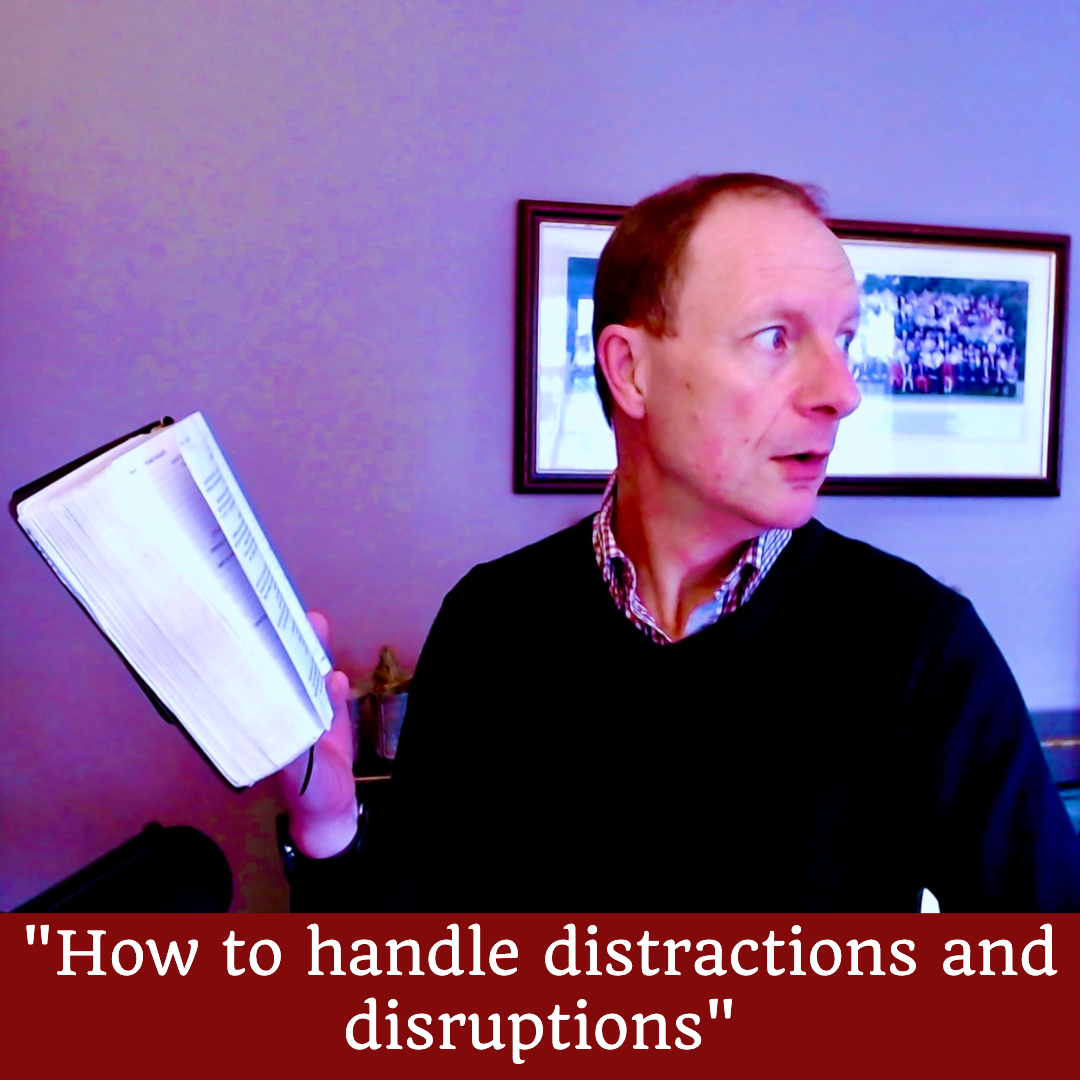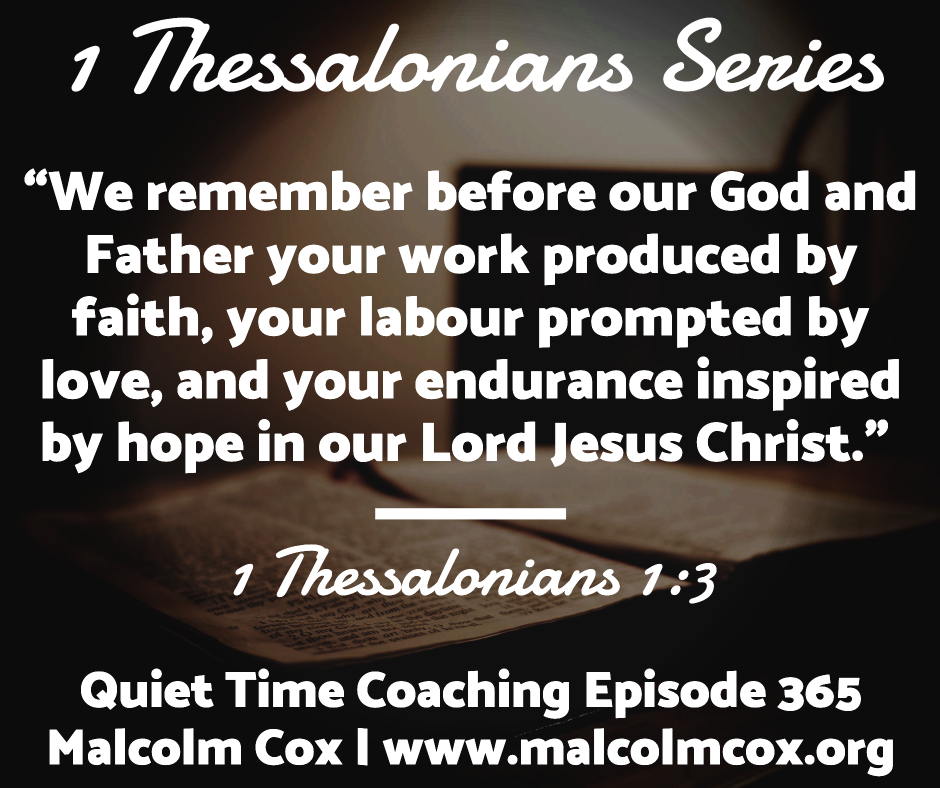Tuesday Teaching Tips, Episode 194
What happens when something disrupts your lesson? What do you do when a good proportion of your audience is distracted by something?
We had a situation last Saturday. I was teaching a series of lessons on the Beatitudes (link to the YouTube live feed here). Several disruptive and distracting things occurred. In no particular order they included:
- Late-comers.
- Noisy movement of chairs.
- People walking out of the room and back in again within full sight of everyone.
- A trolley of jangling cups and saucers being moved.
- A crying baby
- And more
After the event my wife said to me, “You should do one of your teaching tip recordings about how to handle distractions and disruptions. You did a brilliant job today!” Well, far be it from me to go against my wife’s wishes! Let’s have a look today at some principles and practicals of how to handle disruptions and distractions while you are teaching or preaching.
- Remember Jesus. Remember that he was interruptible. Not all disruptions are a problem. Sometimes they are the very opportunity the Holy Spirit is giving you to help someone. I’ve recorded before about the question someone asked me towards the end of one of my sermons as I was wrapping up with my nicely prepared concluding thoughts. A momentary flash of annoyance at the interruption was soon replaced with gratitude that I now knew more about what mattered to that person. The individual matters more than the point we are making. Take, for example, the situation in Matthew 9. Jesus is engaged in preaching on new and old wineskins when he is first interrupted by a synagogue leader, and then swiftly afterwards by a woman who touches his cloak. He is not upset. He does not dismiss them. He allows himself to be interrupted and, lo and behold, the work of God is done.
- Numbers. The general rule regarding numbers is that the smaller the group, the more attention you will need to paid to disruptions. In a large group disruptions are not as noticeable. Therefore, if you are regularly teaching to a smaller group be prepared to pause and deal with distractions as part of the normal way of doing things.
- Be gentle. If you need to say something to deal with a distraction then do it with gentleness and respect. A few years ago we had a situation with a couple of toddlers running around at the back of the hall during the service – including the quieter parts of communion and prayer. It’s not so much that they were moving, but that they were noisy! I got up and said something like, “It sounds like some of our children could do with a bit of comforting from their parents.” The remark received a little laughter, the parents were moved to action and the situation settled down. Afterwards a parent came up to me and thanked me for making light of the situation. They mentioned that in the past parents had been effectively rebuked from the front for not keeping their children perfectly quiet. That approach did not help the parents nor the children, and seems entirely inappropriate given the way that Jesus found children to be fascinating and allowed them to interrupt him. Gentleness and humour help to defuse tricky situations.
- Give in. Sometimes you just have to give him. A year or two ago in the Watford church we were part way into the sermon when someone knocked over a large cup of coffee. It was a real bucket! The brown nectar spread over a very wide area. People seated nearby were picking up handbags and moving their feet away from the flood. Chairs were moved. I stopped the sermon, and suggested we pause while the coffee was mopped up. Then we carried on. By nature I’m the kind of person who would press on, but there are times to give in. Indeed, there are times when something more significant happens. On one occasion somebody had an epileptic fit during the sermon ( I don’t think it was caused by my preaching!). That lesson certainly had to be put on pause until the person had been helped. We called for first aiders to make themselves known and the person was given the comfort they needed. A good few years ago I was preaching and noticed several burly policemen coming in at the rear of the church hall. They moved purposefully towards a visitor and a scuffle ensued as they arrested him and took him out. That time I stop preaching and asked one of our worship leaders to step up and lead a song.
- Press on. Having said that, there are times to keep going. If we stop for every distraction we will be unlikely to finish! How do you know when to press on? I would say as long as you’ve got the attention of the majority of the group you can keep going. If congregations get used to the idea that we stop at every disruption it tends to make the group even more sensitive to such disruptions. I remember a story told to me by Duncan Comrie in Durban, South Africa. He visited one of our congregations in Zimbabwe. Partway through the church service the power went out. They carried on singing and worshipping in the dark for about three hours. What else are you going to do?!
- Engagement. The more engaging you are as a speaker, the less distractions will cause a significant problem. It’s important to be energetic, filled with conviction, personable and connected with the congregation. On the other hand, if you are aloof, boring, droning on past the time most people would wish you to finish, you should not be surprised if the congregation are easily distracted.
- Hecklers. What you do when someone heckles you? It’s happened to me a few times. The general rule is to not engage. If you are a professionally trained comedian or someone with the rare gift of, and some will remember him, someone like James Lloyd, then by all means engage. But for most of us mere mortals we need to stay well away from public debate. Here of course I’m not talking about someone with a genuine question but someone who has the aim of disrupting the meeting. Proceed with the following steps: 1. Offer to speak with the heckler afterwards when you can have a conversation; 2. If that does not quiet them, ask them firmly but gently to stop heckling so that everybody else can learn together; 3. If they refuse, ask them to leave; 4. If they persist, stop proceedings until they either sit down and are quiet or have left. Should you forcibly eject them from the premises? Only as a very last resort and if you feel the safety of members is threatened. It is better to call the police. Most often simply making that threat, or making the phone call within the heckler’s hearing is enough to prompt them to depart. On the rare occasions I have been heckled by disturbed members of the church I have found that simply remaining calm and kind has kept the disruption to a manageable minimum.
- World events. Sometimes the disruption and destruction may not happen as part of your meeting. Occasionally it can be an event of local, national or world significance. I remember the day that Princess Diana died. That Sunday the atmosphere in church was, well is no better word for it than weird. I pressed on with the normal service and sermon, making acknowledgement of what had happened (everybody knew), but not allowing it to shape the service particularly. That was a mistake. No one paid any attention to anything I said that day. It was impossible. I would have done better to acknowledge it, and change the whole format of the service on the fly and change my lesson.
- Weather. Sometimes the weather can be a distraction. When it’s particularly cold keep everything short. When it’s particularly hot keep everything short. When it’s windy keep everything short. Can you spot the theme? I have noticed that when winds are strong and noisy it seems to unsettle congregations more than any other weather condition. In fact, I first noticed this when I was a schoolteacher many moons ago. It was particularly difficult to get the children to settle in class and pay attention when they could hear the wind whistling past the windows. Adults are less susceptible, but are still affected. When it’s very windy (or when the weather is unusual) acknowledge it. Most likely you will need to be a little bit more energetic and engaging to help people have their attention focused on the Scriptures. As a general rule, when weather is strange, keep your lesson shorter.
What I’d like to know today is, “How do you handle distractions and disruptions? What have you found that works, and what does not?”
Please add your comments on this week’s topic. We learn best when we learn in community.
Do you have a question about teaching the Bible? Is it theological, technical, practical? Send me your questions or suggestions. Here’s the email: malcolm@malcolmcox.org.
If you’d like a copy of my free eBook on spiritual disciplines, “How God grows His people”, sign up at my website: http://www.malcolmcox.org.
Please pass the link on, subscribe, leave a review.
“Worship the LORD with gladness; come before him with joyful songs.” (Psalms 100:2 NIV11)
God bless, Malcolm
PS: You might also be interested in my book: “An elephant’s swimming pool”, a devotional look at the Gospel of John

